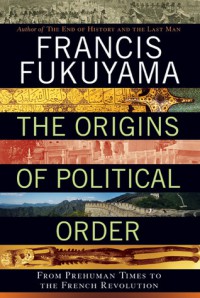Jocelyn (The Reading World)
I love to read and can get very attached to my opinions, but recently I've been learning not to completely lose my head when people disagree with me, so feel safe to argue with me whenever you wish ;)
The Origins of Political Order by Francis Fukuyama

This is my first foray into political science, which maybe explains why I took so long to read it. Occasionally, I got lost in Fukuyama's analysis until his thesis reasserted itself. In retrospect, it's an impeccably organized book, comparing the history of political development in four broad geographical areas: China, India, the Muslim world, and Europe.
China is examined first, with the justification that it was China who first invented the modern state. With the Western Zhou dynasty in the first millennium BC came the rise of feudalism. That is, de facto power was split among several self-sufficient lords and the king mainly held ritual power. Over the course of several centuries, the territories emerged as states in their own right. This process was prompted through extensive warfare, motivating rulers to increase the size of their bureaucracies and mobilize ever-larger numbers of the population during the Warring States Period. Hundreds of years later, Europe would go through the same process, the main difference being that European period did not end in national unity as China did with the Qin empire.
Next Fukuyama examines India. It should be noted that one of the book's major assumptions is that the trends for present-day politics were laid thousands of years ago at the roots of a region's civilization. Unlike China, India never developed a powerful, centralized state because of one major reason: the caste system. The stratification of society was strong enough to oppose any force that could override the separation of the Brahmins, Kshatriyas, Vaishyas and Shudras. This legacy endures today in modern Indian democracy, where multiple interest groups block the efficient passing of legislation and the strength of society exceeds the strength of the state.
For some reason, I remember a lot less of Fukuyama's discussion of the Muslim world other than two things. The first was the institution of military slavery, created to counter the fundamental aspect of human nature that favors kinship at the expense of centralized state power. The second is that Fukuyama uses the initial growth of Islam after Muhammed to illustrate a war for "recognition"--that is, the acknowledgement of status and worth--as a refutation of the idea that all human conflicts are fought over a few essential economic resources.
Lastly comes Europe. According to Fukuyama, the exit out of tribalism--a universal stage in political development across all cultures--occurred through Christianity, forming a strong social counterweight to the power of kings. As a mobilizing force, it instilled a loyalty to religion first, and family second. At this point, it's either me being muddleheaded or Fukuyama's analysis blurring together; many distinctions are made between Western and Eastern Europe, but other than the development of serfdom in the latter, I can't remember. Someday, I'll have to reread this section as well as the Muslim one.
One fascinating topic that Fukuyama sets out to answer is the question of what makes the most successful form of government. His thesis sets forward three separate institutions:
1) the state, or monopoly of military power over a defined piece of territory
2) the rule of law, a written body of rules whose legitimacy transcends generations
3) accountability, the subordination of sovereignty to the will of the people
In terms of historical timeline, institutional change is slow, resistant, and bloody in the end. Even in the most dysfunctional systems, there will be existing stakeholders who block institutional change because of the threat of personal loss. In this instance, the threat of violence is often the most viable path forward. This was how China and Europe developed state efficiency. How present-day regimes suffering from corruption can resolve this issue is a topic that is touched upon, but probably expanded on further in the sequel, to which I look forward.
Now if somebody could hand me a military strategy version of this book, I would be very happy.






 2
2
